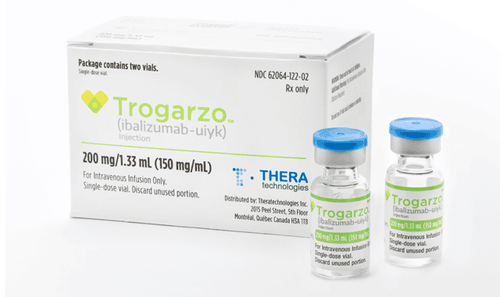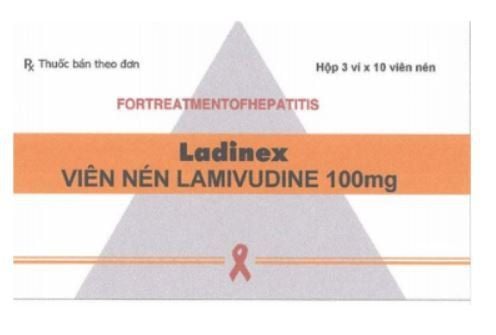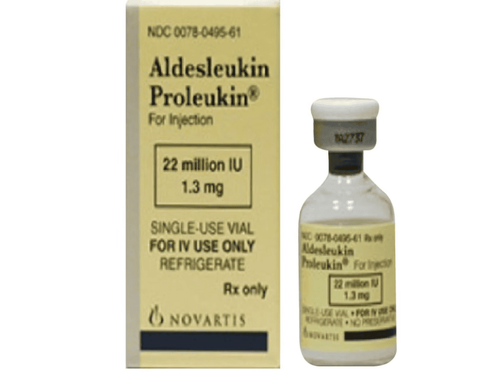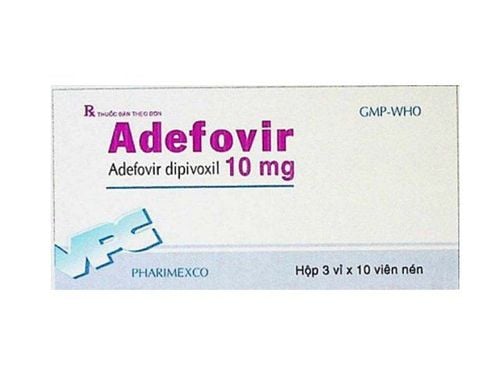This is an automatically translated article.
Proxivir is an oral antiviral drug, indicated for use in cases of chronic active hepatitis B virus infection and HIV infection. Due to the effect of the drug can cause some effects on other organs in the body, it is necessary to have regular function tests when taking it.
1. What is Proxivir?
The active ingredient of Proxivir is Tenofovir disoproxil fumarate drug with the content of 300mg, the dosage form is film-coated tablets. This is an antiviral drug.
Tenofovir disoproxil fumarate is a helical nucleotide analogous to adenosine monophosphate, which is a prodrug of Tenofovir. After being phosphorylated to the active diphosphate form, tenofovir diphosphate is active against HBV polymerase and HIV reverse transcriptase.
Tenofovir diphosphate inhibits viral polymerase (reverse transcriptase) by direct competition with the natural substrate deoxyribonucleotide.
2. Uses of Proxivir Tablet
Proxivir is indicated for use in the following cases:
Chronic hepatitis B in adults with decompensated liver disease, evidence of viral activity and histopathology of active hepatitis motion or fibrosis. Combination with other antiretroviral drugs in the treatment of HIV. Contraindications:
Do not use the drug if you are sensitive to Tenofovir or any of its ingredients. Due to the fact that the excipient is Lactose, you should not use this medicine if you have galactose intolerance, glucose or galactose malabsorption, the lactase deficiency.
3. Dosage and how to take Proxivir Tablet
How to use: The drug is taken orally, do not chew or crush the tablet before taking. To ensure the effectiveness of taking Proxivir Tablet you should take this medicine regularly and on time. The drug should be taken on a full stomach because food may help increase the bioavailability of Tenofovir.
Dosage:
Treatment of HIV: The dose of Tenofovir Disoproxil Fumarate is 300mg, once a day. Must be used in combination with other antiretroviral drugs. Active chronic hepatitis B disease in adults (18 years of age and older) with normal renal function: The recommended dose is 300mg once daily, taken with a full stomach. Renal Impairment: Dosage adjustment is required in patients with renal impairment. As Tenofovir is eliminated by the kidneys, concentrations of Tenofovir are increased in patients with renal impairment.
Patients with creatinine clearance ≥ 50ml/min: Administer the drug at the recommended dose of 300mg every 24 hours. Patients with creatinine clearance 30-49ml/min: 300mg every 48 hours. Patients with creatinine clearance between 10 - 29 ml/min: 300 mg every 72 - 96 hours. People on hemodialysis: Take 300mg every 7 days or after the total hemodialysis time is nearly 12 hours. Hepatic impairment: No dose adjustment is necessary in patients with hepatic impairment.
Overdose:
Symptoms of overdose have been reported including nausea and vomiting, skin rash, hypophosphatemia, acute renal failure, liver lactic acid poisoning. In case of overdose, the patient needs symptomatic and supportive treatment.
4. Undesirable effects of Proxivir Tablet
When taking Proxivir Tablet you may encounter side effects including:
Common side effects are on the gastrointestinal tract such as nausea and vomiting, diarrhea, bloating, indigestion, loss of appetite; Uncommon side effects: Causes low blood phosphate levels; skin rash may occur. Cases of elevation of liver enzymes, liver disease, hypertriglyceridemia, hyperglycemia, neutropenia, nephritis, renal failure, acute renal failure and possible tubular involvement, including renal failure, have been reported. Fanconi syndrome; Lactic acid poisoning, fatty liver and cirrhosis. Other effects such as: Peripheral neuropathy, headache, dizziness, somnolence, depression, shortness of breath, bronchial asthma, excessive sweating, muscle pain. If you experience side effects while using the drug, you should inform your doctor for the most appropriate advice.
5. Precautions while taking Proxivir Tablet
When taking drugs to treat HIV or HBV, although effective viral suppression with antiretroviral therapy has been shown to significantly reduce the risk of sexual transmission, it cannot be ruled out. small residual risk. Transmission precautions still need to be taken in accordance with the guidelines. Effects on the kidneys: Because Tenofovir is eliminated mainly by the kidneys. It is recommended that creatinine clearance and renal function be calculated prior to initiating treatment with tenofovir disoproxil fumarate and monitored after 2 to 4 weeks of therapy, after 3 months of therapy and every 3 to 6 months thereafter in patients patients without risk factors. In patients at risk of impaired renal function, more frequent monitoring of function is required. Avoid concomitant use of Tenofovir disoproxil fumarate or near the time of administration of known glomerular-toxic preparations such as Aminoglycosides, Amphotericin B, Foscarnet, Ganciclovir, Pentamidine, Vancomycin, Cidofovir or Interleukin-2. If concomitant use of Tenofovir disoproxil fumarate and other nephrotoxic agents cannot be avoided, renal function should be monitored weekly. Cases of acute renal failure after initiation of high or continuous doses of nonsteroidal anti-inflammatory drugs (NSAIDs) have been reported with tenofovir disoproxil fumarate. If Tenofovir disoproxil fumarate must be used in combination with an NSAID, adequate renal function should be monitored. Effects on bones: A slight decrease in bone density (BMD) of the hip and spine has been observed. The decrease in bone density in the spine and hips is increased with long-term use. An alternative regimen should be considered for patients with osteoporosis at high risk for fracture. Weight gain, increased lipids and blood glucose may occur during treatment with this antagonist. These changes may, however, be partly related to disease control and lifestyle changes. But monitoring of lipids and blood glucose still needs to be carried out according to the guidelines for HIV treatment. Dyslipidemia, if present, can be controlled by appropriate clinical measures. Liver disease: Very few people have been found to experience more severe conditions than hepatitis. A flare of hepatitis can also occur during treatment, which manifests itself after initiation of antiviral therapy. Serum ALT(GPT) may be elevated in some patients, particularly in cirrhotic patients who may be at higher risk of developing decompensated liver disease following an outbreak of hepatitis. Outbreaks of Viral Hepatitis After Discontinuation of Treatment: An outbreak of acute hepatitis has also been reported in patients who discontinued hepatitis B therapy. Exacerbations after discontinuation of therapy are often associated with an increase in the incidence of hepatitis B. HBV DNA and in the majority will be self-limiting. However, severe outbreaks, including deaths, have been reported. Liver function should be closely monitored at time points for at least 6 months after stopping hepatitis B treatment. If flare-up occurs, hepatitis B therapy can be continued, especially in patients with advanced liver disease. If you have developed or have developed cirrhosis, discontinuation of this drug is not recommended because an outbreak of hepatitis after treatment may lead to hepatic decompensation. Treatment with Tenofovir Disoproxil Fumarate must be discontinued when the aminotransferase levels increase rapidly, the liver gradually enlarges, or the liver is fatty, metabolic acidosis or lactic acidosis of unknown cause. Osteonecrosis: Although this disease is thought to be the result of a variety of causes (including corticosteroid use, alcohol consumption, severe immunosuppression, high body mass index), cases of osteonecrosis Bone death has also been reported, particularly in patients with advanced HIV or long-term CART. Patients should consult a doctor if they experience symptoms of joint pain, stiffness or difficulty in movement. Children and the elderly: Currently, the efficacy and safety of this drug in patients under 18 years of age is unknown. In the elderly, because clinical studies with Tenofovir have not been conducted in an appropriate number of patients 65 years of age and older to see if they respond differently to younger adults, caution should be exercised in selecting the appropriate dose. Due to the drug has undesirable effects such as headache, dizziness, somnolence. Therefore, patients should be careful when driving or operating machinery. Especially in the beginning when taking the drug. Pregnant women should use this medicine only when the benefit outweighs the risk to the fetus and should not breast-feed while taking this medicine.
6. Drug interactions
With other drugs containing Tenofovir disoproxil fumarate or Adefovir dipivoxil should not be combined; Didanosine; Avoid co-administration of tenofovir with nephrotoxic drugs; Interactions with Atazanavir/ritonavir, Lopinavir/ritonavir, Darunavir/ritonavir: No dose adjustment is required when these drug pairs are combined. However, prompt assessment of renal function is required. Store Proxivir in a cool dry place, the storage temperature is below 30°C, protected from light and moisture. Note, the place to put the medicine should be out of reach of children.
Proxivir Tablet is a prescription drug, used under the direction of a doctor. You only use this medicine when the disease is confirmed and must be closely monitored during treatment. If any unusual symptoms occur while taking the drug, you should report it to your doctor.













